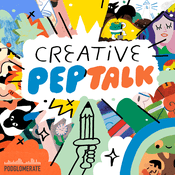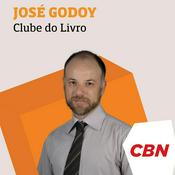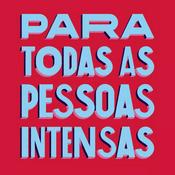192 episódios
- Ad-free audiobook summary & exclusive content | Show notes (Free Summary) | PDF & Infographic | Free audiobook | Elevate your chat game with Leil Lowndes' How to Talk to Anyone! Discover 92 foolproof tricks to charm, disarm, and connect in any scenario.
🇩🇪 German
Read on your terms. Start a free trial of StoryShots: https://www.getstoryshots.com to get the extended ad-free audiobook, PDF, infographic, and animated version of this summary and 300,000 more bestselling books.
⭐️⭐️⭐️⭐️⭐️ Help us grow to create more amazing content for you! Don't forget to subscribe, rate and review the StoryShots podcast now.
What should our next book be? Suggest and vote it up on the free StoryShots app.
If you don't already have the book, order it here or get the audiobook for free to learn the juicy details.
Leil Lowndes is a recognized communications expert. She has conducted communication seminars for major US corporations, foreign governments, and the US Peace Corps. Lowndes has appeared on hundreds of television and radio programs. She has authored ten bestselling books on communications. These books have been published in over 26 foreign languages
How to Talk to Anyone is a psychology-backed book that offers guidance on effective communication. Lowndes covers a wide range of communication types, broken down into verbal and nonverbal, across almost every possible context. Your approach should adapt depending on whom you are talking to and the specific context. So, How to Talk to Anyone offers guidance on how you can become a master communicator. As a master communicator, you can connect with others irrespective of the environment.
80% of first impressions is the way you look and move. In fact, studies suggest that emotional reactions occur in our brains before we even have time to register a reaction to somebody. So, try to utilize Leil Lowndes’ tips to intrigue everyone through your first impressions.
Lowndes advises against quick smiles. If you interact with somebody, you should start by looking at their face for a second and pausing. This pause will let you soak in their persona. You should then let out a big warm smile that floods across your face. Allow this flood to overflow into smiling with your eyes. While engaging with the flooding smile, you should also try to maintain eye contact. Others will respect you more if you maintain strong eye contact. Specifically, this ability is associated with intelligence and abstract thinking.
Lowndes’ second technique builds on the importance of maintaining eye contact. She describes how you should adopt sticky eyes. This means you should not break eye contact even after they have finished speaking. Once you have decided to break eye contact, you should do so slowly and reluctantly. Lowndes believes this approach will send a message to others to comprehend their conversation and respect them as an individual.
If you are seeking romance, you should use what Lowndes describes as epoxy eyes. If you are romantically interested in someone, maintain deep eye contact with them even when they are not the person talking. If they are interested in you, keeping eye contact while they are a listener can be an effective aphrodisiac.
(00:00) Introduction and Overview of How to Talk to Anyone
(01:17) About the Author: Leil Lowndes
(01:46) First Impressions: The Power of Your Smile and Eyes
(03:45) Mastering Small Talk
(04:58) Starting Conversations Effectively
(05:52) Avoiding Common Conversation Pitfalls
(06:16) Making Others Feel Special
(06:50) Handling Challenging Conversations
(07:29) Engaging with Celebrities
(08:04) Understanding Others' Passions
(08:55) Conclusion and Next Steps from How to Talk to Anyone
Related Books
Surrounded by Idiots by Thomas Erikson
How to Win Friends and Influence People by Dale Carnegie
The Art of Seduction by Robert Greene
Get the Guy by Matthew Hussey
First published on 30/03/24.
Learn more about your ad choices. Visit megaphone.fm/adchoices I Will Teach You to Be Rich by Ramit Sethi Book Summary and Review | Free Audiobook
20/1/2026 | 19minShow notes / PDF & Infographic / Free audiobook / 🇩🇪 German / Are you tired of scraping by and ready to flourish your bank account? Do you want to break free from the paycheck-to-paycheck cycle and live your life your way? Look no further. Get ready to unlock the secrets of financial success with I Will Teach You to Be Rich.
📚 READ 1 MILLION BOOKS IN MINUTES: For free. Get the PDF, infographic, extended ad-free audiobook and animated version of this summary and more exclusive content on the top-rated StoryShots app: https://www.getstoryshots.com
⭐️⭐️⭐️⭐️⭐️ Don't forget to subscribe, rate and review the StoryShots podcast now to help us grow and create more amazing content for you.
What should our next book be? Comment on Spotify/iTunes or vote it up on the StoryShots app.
Key figures and topics:
Personal Finance, Investing, Automation, Wealth-Building, Financial Mindset, Entrepreneurship, Ramit Sethi, I Will Teach You To Be Rich, Carrie Underwood, Luke Bryant, story shorts, StoryShots, investing, Personal finance, budgeting, Wealth building, automation
In the book summary of I Will Teach You to Be Rich by Ramit Sethi, the focus is on developing a personal financial strategy that empowers individuals to take control of their financial futures. The book emphasizes the importance of defining what being rich means to you personally, and encourages conscious spending by tracking expenses and making informed financial decisions. Sethi advocates for prioritizing spending on things you truly love while cutting back on less important expenses.
The summary highlights key strategies for financial success, including starting early to leverage compound interest and breaking free from excuses that hinder financial growth. Sethi recommends focusing on macro financial decisions rather than getting caught up in minor cost-cutting measures. The book outlines 12 critical financial strategies, such as automating your money system, maintaining a good credit score, getting employer 401k matches, and negotiating raises.
A central theme of the book is creating an automatic money management system that simplifies financial planning and helps individuals stick to long-term financial goals. By setting up multiple accounts for different purposes - including checking, savings, credit cards, retirement, and investment accounts - individuals can more effectively manage their finances. Sethi's approach is practical and non-judgmental, focusing on creating sustainable financial habits that align with personal values and long-term objectives.
Key takeaways:
Define what being 'rich' means to you personally and practice conscious spending by prioritizing expenses that truly matter to you
Start investing and building wealth early to leverage compound interest and establish smart money habits over time
Avoid making excuses that prevent financial progress; take action even if your initial steps aren't perfect
Focus on macro financial strategies like automating your money system, maintaining a good credit score, and contributing to retirement accounts rather than getting stuck on minor expenses
Set up an automatic money management system with multiple accounts (checking, savings, credit card, retirement, investment) to simplify finances and ensure consistent financial habits
Prioritize five to ten key financial actions that yield significant results, such as negotiating raises, cutting major expenses, and using credit cards strategically
(00:00) Book Summary and Synopsis of I Will Teach You to Be Rich
(01:05) Introduction to Financial Success
(01:39) The Four Pillars of Personal Finance
(02:29) About Ramit Sethi
(03:26) Define What Being Rich Means to You
(04:47) The Importance of Starting Early
(06:02) Excuses Hinder Growth
(08:45) Focus on Macro Decisions
(10:43) Setting Up an Automatic Money System
(12:15) Benefits of an Automatic Money System
(13:18) Make a Money Bucket
(13:26) Conclusion and Next Steps
Learn more about your ad choices. Visit megaphone.fm/adchoices- Show notes | PDF & Infographic | Free Audiobook | What can a high-powered lawyer-turned-monk teach us about true success? In this audiobook summary, we break down the 7 virtues from The Monk Who Sold His Ferrari — simple principles for a more meaningful, joyful life.
Read on your terms. Get the PDF, infographic, extended ad-free audiobook and animated version of this summary and 1 million more books the top-rated StoryShots app: https://www.getstoryshots.com
Help us grow to create more amazing content for you! ⭐️⭐️⭐️⭐️⭐️ Don't forget to subscribe, rate and review the StoryShots podcast now.
What should our next book be? Suggest and vote it up on the StoryShots app.
Key topics and figures:
Self-improvement, spirituality, time management, Purpose, Mindfulness, Kindness, Discipline, Robin Sharma, The 5 AM Club, The Monk Who Sold His Ferrari, StoryShots, Kaizen, Self-Improvement, Gratitude, Spirituality, Kaizen
Robin Sharma's book 'The Monk Who Sold His Ferrari' is a transformative narrative about Julian Mantle, a successful lawyer who leaves his stressful life behind to seek enlightenment in the Himalayan mountains. After encountering Yogi Raman, Julian learns seven virtues for achieving inner peace, personal growth, and spiritual fulfillment. These virtues are fundamentally about mastering one's mind, understanding personal purpose, and developing self-discipline.
The seven virtues include mastering your mind through positive thinking and meditation, following your purpose by setting clear goals, practicing Kaizen (continuous improvement), developing self-discipline, respecting time, serving others selflessly, and embracing the present moment. Sharma emphasizes techniques like rose meditation, goal-setting, performing small acts of courage, and maintaining a mindset of gratitude and personal growth.
Central to Sharma's philosophy is the idea that success and happiness come from within, and individuals must consciously cultivate their mental, physical, and spiritual potential. He recommends daily rituals such as solitude, physical exercise, reading, personal reflection, and maintaining a simple lifestyle. The ultimate message is about taking control of one's life, discovering personal calling, and living with intention, passion, and compassion.
Key ideas:
Mastering your mind involves consciously cultivating positive thoughts and treating your brain like a garden, deliberately choosing to replace negative thoughts with positive ones such as kindness, love, and empathy
Discover and pursue your life's purpose by setting clear, written goals, as unwritten goals lack power and commitment
Practice Kaizen, a Japanese philosophy of continuous improvement, by consistently engaging with small acts of courage and incrementally developing your skills and character
Develop self-discipline through consistent small acts of courage, understanding that willpower is the essential virtue of a fully actualized life
Respect your time by focusing on high-impact activities, using principles like the 80/20 rule to maximize productivity and minimize procrastination
Serve others selflessly and practice daily acts of kindness, recognizing that the quality of your life is determined by the quality of your contributions to the world
Live in the present moment, appreciating life's small joys and avoiding sacrificing happiness for future achievements
Key quotes of The Monk Who Sold His Ferrari:
"You don't attract what you want, you attract who you are." - Robin Sharma
"The quality of your life is determined by the quality of your contributions to the world." - Robin Sharma
"Self mastery is the DNA of life mastery." - Robin Sharma
Related Book Summaries
The 5 AM Club by Robin Sharma
Who Will Cry When You Die? by Robin Sharma
The Power of Now by Eckhart Tolle
Man’s Search for Meaning by Viktor Frankl
Be Here Now by Ram Dass
This episode was first published on January 21, 2021 but was updated on January 21, 2022.
Learn more about your ad choices. Visit megaphone.fm/adchoices - Show notes | PDF, infographic, animated summary | Your Best Year Ever is a self-help book that examines goal-setting across different areas of your life.
🚀 Your Best Year Ever by Michael Hyatt Summary
Get the full ad-free audiobook, PDF, infographic, and animated summary on the StoryShots app:
Get the audiobook for FREE: https://geni.us/your-best-year-audio
Stop setting goals that fade by February! This summary of Michael Hyatt's Your Best Year Ever breaks down the 5-step system to achieve your most important goals. Learn the SMARTER goals framework, the power of a weekly review, and how to quit-proof your ambitions.
In this summary, you'll learn:
• The 5-step plan for achieving your goals
• How to set SMARTER goals (Specific, Measurable, Actionable, Risky, Time-keyed, Exciting, Relevant)
• The power of a 30-minute weekly review
• How to overcome limiting beliefs
• The secret to staying motivated all year long
📚 RELATED BOOK SUMMARIES:
• Atomic Habits by James Clear
• Deep Work by Cal Newport
• The 7 Habits of Highly Effective People by Stephen Covey:
💬 ENGAGE WITH US:
What's one goal you're ready to achieve this year? Let us know in the comments below! 👇
Don't forget to subscribe, rate, and review the StoryShots podcast! ⭐️⭐️⭐️⭐️⭐️
#YourBestYearEver #MichaelHyatt #GoalSetting #Productivity #SMARTERgoals #BookSummary #AnimatedSummary #StoryShots
your best year ever, michael hyatt, goal setting, productivity, smarter goals, book summary, animated summary, storyshots, self-help, motivation, achievement, new year resolutions, weekly review, full focus planner, goal achievement, how to set goals, how to achieve goals, book review, audiobook
Learn more about your ad choices. Visit megaphone.fm/adchoices - PDF, Infographic, Ad-free Audiobook and Animated Book Summary
/ Talking to Strangers Free Audiobook / 🇩🇪 German / Why do we fail to understand strangers? Malcolm Gladwell reveals the shocking truth.
In this episode, we break down the key ideas from Talking to Strangers—Gladwell's exploration of why our interactions with people we don't know go so wrong.
🎯 What You'll Learn:
• Truth-Default Theory: Why we're wired to believe people—even when we shouldn't
• The Transparency Illusion: Why reading body language is a myth
• Coupling: How context shapes behavior more than personality
• Why spies, con artists, and liars fool even the experts
• The tragic cases of Sandra Bland and Amanda Knox explained
💡 Key Takeaways:
1. We default to trust. It's not a bug—it's a feature of human society. But it makes us vulnerable to deception.
2. Faces lie. Studies show we're no better than a coin flip at detecting lies from facial expressions.
3. Context matters more than character. Behavior is "coupled" to circumstances. To understand someone, examine their world.
4. Mismatched people get misjudged. When behavior doesn't match expectations, our judgment fails catastrophically.
5. Humility is the answer. The right way to talk to strangers is with caution, not confidence.
📚 Related Book Summaries:
• Blink by Malcolm Gladwell
• Outliers by Malcolm Gladwell:
• The Tipping Point by Malcolm Gladwell:
• Influence by Robert Cialdini:
• Thinking, Fast and Slow by Daniel Kahneman:
🎧 Get the Full Experience:
• Read the full summary: https://www.getstoryshots.com/books/talking-to-strangers-summary/
• Download the StoryShots app: https://www.getstoryshots.com/
📖 About the Book:
Talking to Strangers by Malcolm Gladwell examines high-profile cases—from Bernie Madoff's Ponzi scheme to the death of Sandra Bland—to show why we misread people. Published in 2019, it became an instant bestseller and challenges everything we think we know about human interaction.
🔑 Who This Episode Is For:
• Leaders making hiring decisions
• Anyone who's been fooled or misjudged
• True crime enthusiasts
• Students of psychology and human behavior
💬 Discussion Question:
Which theory resonates most with you—Truth-Default, Transparency Illusion, or Coupling? Drop a comment!
#TalkingToStrangers #MalcolmGladwell #BookSummary #StoryShots #Psychology #HumanBehavior #TruthDefault #PersonalDevelopment
Learn more about your ad choices. Visit megaphone.fm/adchoices
Mais podcasts de Arte
Podcasts em tendência em Arte
Sobre Best Book Summaries 📚 by StoryShots
Have you ever left a great book unfinished? Instead, learn or review the key takeaways of bestselling nonfiction, personal development and business books in minutes, instead of hours or never. Get through your stack of unfinished books or meet your next great read. Learn on your terms with text, PDF, audiobook, animation, infographic and mind map summaries of business and personal development books. Learn more at https://www.getstoryshots.com/
Support us by becoming a premium subscriber and get access to exclusive content: https://storyshots.supercast.com/
COPYRIGHT NOTICE: The content provided in this podcast is analysis, critique, commentary and summary of books. The content falls under Copyright Fair Use. For any other copyright inquiries, please contact [email protected].
DISCLAIMER: The content provided here is unofficial and does not replace professional help.
FREE AUDIOBOOKS: StoryShots is an affiliate of Audible. We earn a small commission every time you sign up to the free trial of Audible for the first time. These commissions help support the podcast.
Subscribe to StoryShots in 🇩🇪 German on Spotify or Apple, 🇪🇸 in Spanish and 🇫🇷 French.
Help us grow and bring you more amazing content by writing us a review. If you don't want to miss out on new episodes, subscribe and click the bell button to be notified.
Ready to advertise to a fast-growing audience of leaders, entrepreneurs, executives and driven young professionals? Contact [email protected] for sponsorship opportunities.
Site de podcastOuça Best Book Summaries 📚 by StoryShots, Ilustríssima Conversa e muitos outros podcasts de todo o mundo com o aplicativo o radio.net

Obtenha o aplicativo gratuito radio.net
- Guardar rádios e podcasts favoritos
- Transmissão via Wi-Fi ou Bluetooth
- Carplay & Android Audo compatìvel
- E ainda mais funções
Obtenha o aplicativo gratuito radio.net
- Guardar rádios e podcasts favoritos
- Transmissão via Wi-Fi ou Bluetooth
- Carplay & Android Audo compatìvel
- E ainda mais funções


Best Book Summaries 📚 by StoryShots
Leia o código,
baixe o aplicativo,
ouça.
baixe o aplicativo,
ouça.































